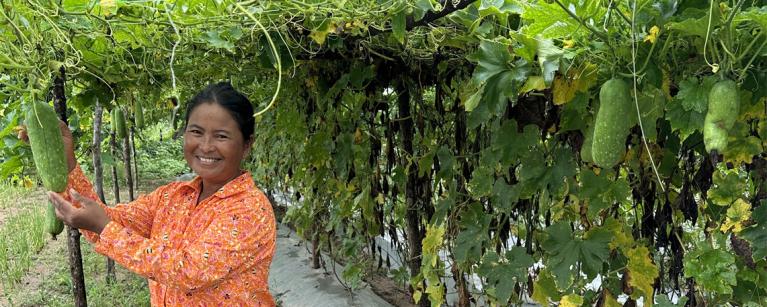Phoeung Lam, 47, is among 30 households in Koh Sralao village, an isolated island in the Mekong wetland of Strung Treng province, who stands out and was chosen as one of the committed farmers to test a new technique for climate-smart farming under the Strengthening Climate Resilience in the Mekong Subregion (SCR) project.
Before receiving support from the SCR project, facilitated by Oxfam and our partner, My Village, Lam and her husband relied on traditional farming methods. They pumped water from the river, stored it in a wooden reservoir, and used a hand tank for watering vegetables. The vegetables were grown on natural plain soils. These practices resulted in low productivity, limited crop varieties and labor burden.
So far, we have introduced a drip irrigation model for climate-adaptive farming in the community. This method includes covering the soil with plastic sheets to prevent grass growth that hindered vegetable cultivation. A new drip irrigation system, connected to a storage water tank, distributes water proportionately to vegetable beds using small, controllable lines. Water is pumped by a small machine from the Mekong River for storage.
“This method requires less water than traditional hand-watering, save labor and increases yields,” said Lam.
On her 500-square-meter plot, Lam grows string beans, eggplants, winter gourds, and corns. In her August 2024 harvest, she earned about $100 from local sales. Last year, it was just enough for her daily consumption. Lam is very optimistic about farming and plans to expand her vegetable production.
Another farmer, Phang Meng, 42, who has applied the same model on his 2,000 square-meter plot earned 1,060,00 Riels ($256), almost 50% increase compared to last year’s traditional method. “I am happy for the project support and will tirelessly continue using this model even if the project phases out, as it sustains our livelihoods and food security,” he said.
Strengthening Climate Resilience in the Mekong Sub-Region is a three-year project launched in March 2022 and implemented in three provinces: Kratie, Stung Treng, Ratanakiri. It aims to reduce vulnerability to disasters and climate risks by enhancing the capacity of riverine communities and local authorities in the Mekong Subregion. The project focuses on developing inclusive climate change adaptation and disaster risk management plans tailored to local needs. It also improves access to hydro-meteorological data for these communities and local authorities.
